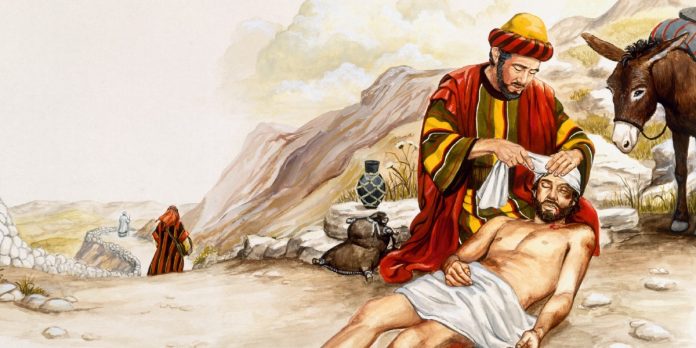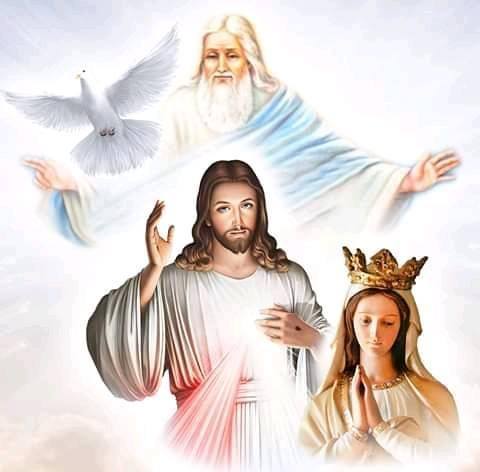‘The thief comes only to steal and kill and destroy’ (Jn 10:10). The only goal of the thief is to rob others. In the process he might destroy their belongings or even endanger their lives. But Jesus came to give us life in all its richness.
Now think of a group of bandits who lie in wait to rob the travellers. Naturally their attention will be to snatch anything that is valuable and at the same time easy to carry. This is why hard cash and jewelleries have traditionally been the primary target of robbers.
But in the Bible, we find a peculiar kind of robbers. We are familiar with the parable of the Good Samaritan. A man was going down from Jerusalem to Jericho, and he fell into the hands of robbers. They left him half dead and went away.Though a Priest and a Levite saw him, they passed by on the other side, ignoring the wounded man who was in urgent need of help. But the Samaritan who came next was moved with pity. He went to him and bandaged his wounds, having poured oil and wine on them. Then he put him on his own animal, brought him to an inn, and took care of him. After telling this beautiful parable to the man who wanted to justify himself, Jesus says; “Go and do likewise” (Lk 10:37). This parable is the true model of Christian charity and the phrase ‘ Good Samaritan’ is not confined to English alone. Its literal translation is being used in many languages across the world to describe those who do works of charity and mercy without expecting anything in return.
One thing that often skips our attention in this narration is something that those robbers did after committing the crime. We read in the gospel that the robbers ‘stripped him (of his clothes), beat him, and went away, leaving him half dead’ (Lk 10:30). Like any other robber, they also should be looking for the valuables of that poor man. But what benefit did it bring them by stripping him and taking away his clothes?
To understand why he was stripped of his clothes, we should know the way Jesus taught the people. Parables were his medium of instruction. He used parables for every instance to the extent that the evangelists record that he taught everything through parables and did not teach anything but through parables. But when he was alone with his disciples he used to explain the inner meaning of those parables to them.
Every parable Jesus told had a deeper meaning different from the meaning that the audience could understand at its first hearing. The parable of the Good Samaritan is no exception. We know that the man was going down from Jerusalem to Jericho. Here the key words are Jerusalem, Jericho and going down. As we know, Jerusalem was the place of the God of Israel, the place where His presence was ever present. On the other hand Jericho was a place synonymous with everything bad and ‘was to be devoted to the Lord for destruction’ (Josh 6:17). Joshua specifically instructed the Israelites; ‘As for you, keep away from the things devoted to destruction, so as not to covet and take any of the devoted things and make the camp of Israel an object for destruction, bringing trouble upon it’ (Josh 6:18). Such abominable things happened in Jericho in the past that Joshua told the Israelites in a prophetic tone never to rebuild the city, and in case anybody attempting to rebuild it, he will be punished, which ultimately turned out to be real in the life of Hiel of Bethel during the reign of Ahab (1 Kings 16:34).
The man going down from Jerusalem to Jericho is the symbol of a person walking away from the presence of God. ‘Going down’ certainly indicates the downward plunge in his spirituality. Geographically also, Jericho is situated around three thousand three hundred feet below Jerusalem and the road connecting these two cities, winding through rugged mountains, was steep because the aerial distance between them was a mere 15 miles. At the start of the journey, the only protection that was available to him was his clothes. Was this cloth not the Divine Grace that covered him as long as he was in the presence of God? The white cloth that we receive at the time of Baptism is also the symbol of Divine Grace. In the message to the church in Sardis we read; ‘ If you conquer, you will be clothed like them in white robes…. ( Rev 3:5). Again in the message to the church in Laodicea, we read about ‘white robes to clothe you and keep the shame of your nakedness from being seen….'(Rev 3:18). Cloth is a metaphor for the Divine Grace that envelopes man. In fact the garments of skin made by God to clothe Adam and Eve after their fall was its archetype. Now, imagine for a moment that Adam was the traveller who was going down from the presence of God to a place that God never wanted him to go. Only then will we be able to comprehend the meaning of this parable.
It is difficult for Divine Grace to work for a person who voluntarily leaves God. Those thieves who attacked him did not appear there all of a sudden. They were lying in wait outside the city of God to pounce upon any person coming out of Divine protection. So, once we leave the city of God, expect the unexpected because every road outside the walls of the city of God is marked by the presence of a thief and the real thief is none other than Satan.
But the merciful God does not reject any person, not even the most wretched sinner. He is the good shepherd who goes in search of the lost sheep. He accepts even those who sin against Him and go astray. He appears as a Good Samaritan pouring oil and wine on their wounds. Like the father of the prodigal son, He clothes them with new garments. In short, He restores everything that we lost because of sin, the most important of them being the cloth of Divine Grace. One thing we should give special attention in this parable is that the Good Samaritan treats the stranger by spending his own time and money. Rescue, relief and rehabilitation come absolutely free for the wounded man. In the same way, the healing that Jesus gives us is also totally free. Through sacraments, especially those of Confession and Holy Communion, he pours oil and wine on our wounds and bandages them. He clothes us with new garments. We need to do just one thing. When Jesus meets us on our way from Jerusalem to Jericho, wounded and forsaken, deprived of everything including our clothes, do not rebel. Through this dangerous and treacherous path, another Priest and another Levite might come, but they will also pass by on the other side. Even another Samaritan might come, what is the guarantee that he will be good?
We read that after bandaging the wounded man, the Good Samaritan took him straight to the inn. But how did he arrange to transport the wounded person? ‘Then he put him on his own animal, brought him to an inn, and took care of him’ (Lk 10:34). Until he came across the wounded stranger, the Samaritan was comfortably riding on his animal. At this place a switching of places happens. The Samaritan puts the stranger on the animal and he himself walks along. This is the price of redemption. Jesus voluntarily takes up all the burden of sin from us and makes us comfortably sit in his place. Not satisfied with that, he himself walks along with us until we reach a safe place!
What would have the wounded man done after recovering at the expense of the Good Samaritan? The Gospel is silent about it. But I would like to imagine him terminating his trip to Jericho and instead returning to Jerusalem. Because after this highway robbery, he would not have preferred to continue his journey. Hope that this man returns to the city of God from where he left in search of something else.
Jesus the Good Samaritan also wants us to return to the presence of God. In fact every person experiencing the love of this Good Samaritan should stay with God for the rest of his life. As we said earlier, Adam was the lone traveller through the treacherous path from the kingdom of God to the kingdom of the world, whom Jesus met on the ‘way down’ naked, wounded and forlorn. At Calvary, Jesus switches places with Adam, and of course with all his offspring. Now onwards, we are not to worry about sin or its consequences. Jesus has made up for everything that we lost by sin. Conversion is another name for the act of somebody abandoning his downward journey halfway and returning to God. It is not a mere act but an experience and being inexplicable, one should experience it to know what it is. We need to taste how good our God is, who redeemed us from everything Satan has inflicted on us. Jesus is the only reliable companion in our journey to Heavenly Jerusalem. As long as he walks with us no enemy will dare to confront us. ‘Then I will encamp at my house as a guard, so that no one shall march to and fro; no oppressor shall again overrun them, for now I have seen with my own eyes’ (Zech 9:8).
Finally what went wrong with that unnamed traveller who was going down from Jerusalem to Jericho? It was that he opted to travel alone, which he should not have, given the inherent risks of traversing that rugged mountainous road without a companion. Perhaps this is the takeaway from this parable for us, who often undertake dangerous journeys through treacherous terrains, unaware of what awaits us on our way. Bandits would pounce on us any time and rob us of everything we possess including our clothes and leave us half dead. In the ultimate analysis he would have been safe had he taken a reliable friend with him on his journey. Lucky are we, who are blessed with the company of the most reliable of friends, Jesus.
‘ O taste and see that the Lord is good; happy are those who take refuge in him’ (Ps 34:8)




















